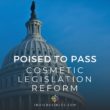Yesterday, in this post, I told you about the hearing entitled Examining the Current State of Cosmetics, hosted by the House Energy & Commerce Committee this past Tuesday. Today, I bring news that HR 4262: The Cosmetic Safety Enhancement Act of 2012 has been introduced. You can open a link to read and download the PDF version of the bill here.

This is a bill, not a law. It has been introduced and will now undergo committee review. This post summarizes at a very high level the provisions contained in the bill. It will be supplemented if appropriate as I continue to read (and re-read) the provisions. If you make cosmetics, this summary is not a substitute for you reading the bill yourself.
In anticipation of two questions I'm sure you will have, the bill, as currently drafted, contains no exemptions for small or micro-business owners, nor does it contain a clause addressing uniformity of law. That does not mean either of those things will not be added later. I just don't know at this point. Here is a high level overview of the major provisions.
- Registration of facilities and products made: The bill proposes that companies be required to register with FDA, among other things, the following: where product is made, brand name of product, product category, and ingredients contained in the product, no later than March 31 of each year.
- Fees: Under the bill, companies would pay an annual fee of $500 beginning 2013. Fees for 2014 and following are set according to a formula contained in the bill.
- Good Manufacturing Practices: The bill requires FDA to promulgate mandatory good manufacturing practices, and to review international GMP standards in so doing. (Current GMP guidelines would presumably remain in effect until FDA does that.)
- Serious adverse events reporting: The bill proposes that companies report any “serious adverse event” regarding use of a product within 15 days of learning of the event. “Serous adverse event” means death, anything life threatening or requiring inpatient hospitalization, and other things listed in the bill.
Retailers that sell to consumers products with their name on them have a similar reporting requirement. Records of these reports are to be maintained for no less than 6 years.
- Safety substantiation: The bill states that companies would have to maintain for no less than five years, a file on each product it makes containing “studies, tests, data, or other information known that relates to the cosmetic products safety and demonstrate that such cosmetic product is safe.”
- Mandatory recall: The bill states that FDA can request that companies voluntarily recall products FDA believes will have “serious adverse health consequences” to humans or animals, and barring voluntary recall, can recall products on its own.
Effective Dates
Under the bill as drafted, most provisions take effect 18 months after the enactment date. Other parts don't take effect until three years after passage.
What Now?
As you know from this week's hearing, the issues of small business exemptions and the need for a uniform rule of law were raised repeatedly and by nearly every lawmaker who posed a question to the witnesses.
I am confident that both issues remain under consideration, and will be keeping an eye out for updates in this regard.
Meanwhile, none of this changes the way the Indie Beauty Network serves its members. We are here to ensure that you are fully informed, to be a positive and useful influence on the process, and to help you implement any new requirements so that your business can flourish and prosper in the face of any changes that may be on the horizon.



